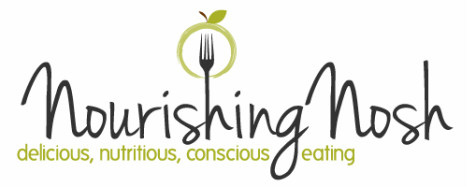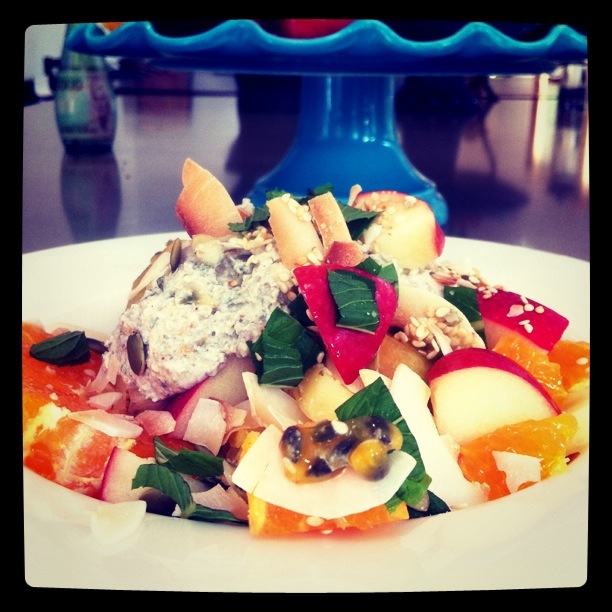|
Omega3 Seed & Nut Dukkah
1/4 cup Linseeds 1/4 cup Chia seeds 1/4 cup toasted sesame seeds 1/4 cup sunflower seeds 1/4 cup pepitas (pumpkin seeds) 1/4 cup walnuts 1/4 cup almonds 1 cup toasted flaked coconut 1/2 tspn cinnamon Makes 2 1/2 cups. Serving size 2 Tablespoons. Blitz linseeds, chia seeds and half sesame seeds in a seed grinder until very fine. Transfer to a food processor and add remaining ingredients. Process until quite fine. The reason you need to blitz the smaller seeds separately is so that your body can absorb their nutrients, otherwise they will go straight through you (with the exception of chia which will get stuck in your teeth.) Store in airtight jar in the fridge (so omega3s do not go rancid.) This is delicious on fruit salad, home made muesli and poached fruit. Tofu Smash serves 2 1 cup silken Tofu 1 passionfruit 4 Tablespoons omega3 seed & nut dukkah In a small bowl whisk Tofu until smooth. Add passionfruit and dukkah and mix until well combined. Serve on top of your fruit salad or spread on wholegrain toast with banana.
2 Comments
Australians are privileged enough to eat at least 3 times a day and usually 5. The foods we purchase and ultimately eat are chosen for a variety of reasons including taste, seasonality, nutritional value, culinary expertise, cost, culture, tradition and more recently sustainability.
The majority of us are passionate about nurturing our bodies and minds and those of our families to ensure good health, vitality and longevity. In our quest to nourish our loved ones, many of us also attempt to choose fresh fruits and vegetables, whole grains, dairy, meat, fish and eggs that are grown using sustainable methodologies. The first step to eating consciously is being aware of the many issues involved in our food system and the equal number of choices and options available to us to overcome theses issues. We look out for seasonal, local, organic, whole foods. For land based food sources this is becoming a lot easier as people are more conscious, there are consumers who are searching out foods whose provenance is being protected, making it easier for the growers to practise sustainable growing techniques. But when it comes to seafood conscious consumerism is not always as easy as we would like it to be. Take the weekly trip to the fish shop for example. Armed with my sustainable seafood guide loaded on my iphone, I skip off to the fishmonger, brimming with expectation. My enthusiasm is soon quashed as my eyes flick frantically around the Greenpeace redlisted white fish fillets. I learn that Deep Sea Bream is actually the 100 year old mercury rich orange roughy, a fish that is thought to spawn once in its lifetime (and that by the bye should only be eaten once a fortnight due to the FSANZ). I ask the fishmonger who is very obliging to look at the sustainable seafood guide and to stock some green rated white fish fillets. I leave 30 minutes later with sardines. I think it is important to say at this point that moderation is important in the quest to be sustainable. We can be 100% conscious and still choose to eat a food that may not be grown to our high standards "on special occasions". Perfection itself is not sustainable so one should not set oneself up for failure - moderation is the key to success. The supertrawler, Margiris, has united Australians in their quest to protect our oceans and may just provide the impetus to encourage Australians to demand more sustainable seafood. There are also a lot of purchasing guides and resources to assist with conscious choices. Among the most important is asking the fishmonger where the fish comes from and how it was caught. Sounds simple but you may be in for a few surprises, like I was with the orange roughy experience. There are a lot of delicious nutritious seafoods that we can choose with a clear conscience including mussels, squid, sardines, whitebait, King George whiting (Previously known as Black, Spotted and South Australian Whiting), Wild Whiting (Several species including Trumpeter, Western Trumpeter, Stout, Sand, Yellowfin, Eastern School & Western School Whiting) and Wild Bream (Yellowfin, Western Yellowfin, Black Bream and Tarwhine (Rhabdosargus sarba) or Trevally (Black, Giant, Golden, Bluefin and Bluespotted Trevally). We can all make a difference by asking the fishmonger to source sustainable seafood. For tips and links take a look at the sustainability page. |
Categories
All
Archives
April 2021
|


 RSS Feed
RSS Feed